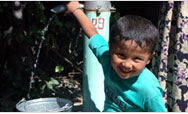Avian and Pandemic Influenza: Preparedness and Response
USAID recognizes the highly pathogenic H5N1 avian influenza (AI) virus as a threat to public health, economic stability, and development in affected and at-risk countries [PDF, 78KB]. Experts fear the virus could mutate into a form capable of triggering a catastrophic human influenza pandemic. While the number of humans who have contracted the virus is low, over 60 percent of cases have been fatal. The potential for it to mutate into a pandemic-capable form increases with human exposure. The virus has also resulted in the deaths of over 240 million birds, affecting the health and livelihoods of millions who depend on poultry for protein and income. (For outbreak updates, see the World Health Organization and World Organization for Animal Health Web sites.)
To help ensure a strategically sound and well-coordinated response to the avian and pandemic influenza (API) threat, USAID implements API programs through its field missions and regional platforms. These efforts are conducted in collaboration with host governments, international and private-sector partners, non-governmental organizations, and other U.S. government partners, which include the U.S. Departments of State, Health and Human Services, Defense, Agriculture, and Homeland Security. Including provision of non-pharmaceutical commodities for disease surveillance and outbreak response, USAID support for API prevention and preparedness efforts has reached nearly 100 countries.
This support helps advance the objectives of the International Partnership on Avian and Pandemic Influenza (IPAPI), which seeks to enhance global pandemic preparedness. Through the IPAPI, which was formed in 2005, nations and international organizations collaborate to improve readiness in key areas. Actions include elevating the issue on national agendas, coordinating efforts among donor and affected nations, mobilizing and leveraging resources, increasing transparency in disease reporting and surveillance, and building capacity to identify, contain, and respond to an influenza pandemic. All partners have endorsed a core set of principles focused on enhancing preparedness, prevention, response, and containment activities.
To date, the total U.S. Government commitment to fighting API is $949 million, with an overall USAID commitment of $543 million for these efforts globally. Of USAID’s funds, $468 million have been obligated, with another $75 million targeted for additional pandemic prevention and readiness efforts.
Latest News and Resources
Related USAID Programs
Additional Information on Avian and Pandemic Influenza
|


